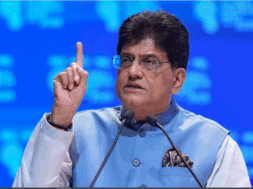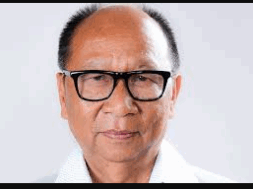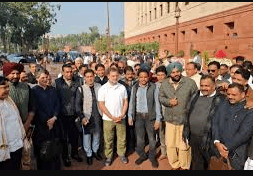
Manas Dasgupta
NEW DELHI, Jan 29: Amidst strong opposition from the Muslim Personal Law Board and criticism by the opposition party members of the committee, the Joint Parliamentary Committee scrutinising the Waqf (Amendment) Bill on Wednesday adopted its report and the amended version of the proposed law with a majority vote, the panel’s chairperson Jagdambika Pal said.
The opposition MP members of the committee voiced their strong criticism of the adopted Bill, which was approved with 15-11 votes, alleging that it was “unconstitutional” and will destroy the Waqf board by allowing for the government’s interference in the religious matters of Muslims.
The Muslim Personal Law Board came down heavily on the allies of the BJP for supporting the Waqf Bill and appealed to the Opposition to unite to defeat the Bill in Parliament. Alleging that the JPC “exceeded its limits and flouted democratic conventions,” the Board alleged that Muslim sentiments were not taken into consideration by the committee, and urged the government to withdraw the Bill.
“We sent more than 36 million emails against the proposed amendments. But they were rejected by the committee. So many Muslim organisations met the members of the committee to register their opposition to the Bill. Yet the committee did not deem it necessary to pay heed to their objections,” S.Q.R. Ilyas, spokesman of the Board, said.
Mr Pal, however, claimed that many of the amendments approved by the committee have addressed several concerns of opposition members as well, adding the Bill once enacted would help Waqf board discharge its duties transparently and more effectively. For the first time, “pasmanda” (backward) Muslims, the poor, women and orphans have been included among beneficiaries of the Waqf, endowment made by Muslims for charitable religious purposes, he added.
The seasoned BJP member said the report would be submitted to the Lok Sabha Speaker Om Birla on Thursday. “It is now for him and Parliament to decide the next course of action,” he told reporters when asked if the Bill will be passed in the budget session of Parliament beginning from Friday.
The committee held 38 meetings in the national capital since its constitution on August 8 last year and toured across the country as it consulted stakeholders to arrive at its conclusions. Opposition MPs, including from the Congress, DMK, TMC, AAP and the AIMIM, maintained their sharp criticism of the committee’s functioning under Pal and the approved version of the Bill. Some of them submitted their dissent and others will be doing so before the deadline.
They said the report running into 655 pages was circulated to them on Tuesday night, and they were given little time to study it and prepare their dissent. TMC MP Kalyan Banerjee claimed the observation and recommendations of the committee are “wholly perverse.” AIMIM MP Asaduddin Owaisi said the proposed law would destroy Waqf boards and make way for the government’s interference in its functioning.
Congress MP Syed Naseer Hussain slammed the amendments as “unconstitutional” alleging that the Bill was aimed at targeting minorities. DMK’s A Raja echoed their view and said his party will challenge the proposed law in the Supreme Court once Parliament, where the BJP-led NDA has a comfortable majority in both Houses, passes it.
Rejecting the criticism, BJP MP Tejasvi Surya said the proposed law aimed to bring transparency and accountability in Waqf boards. This would empower the Muslim community, he claimed. While the adopted Bill accepts the government’s stand of removing the “Waqf by user” clause in the existing law, it has added that no cases will be reopened against such properties on a retrospective basis provided these were not in dispute or belong to the government.
In its 655-page draft report, the Joint Committee on Waqf Amendment Bill made it clear that the provisions to omit the ‘Waqf by user’ definition of a Waqf property will be with prospective effect. It has also endorsed the government’s move to include non-Muslims in Waqf boards, saying they can be “beneficiaries, parties to disputes, or otherwise interested in Waqf matters,” sources said.
It, however, does away with the enquiry power vested with the district collector concerned in cases of disputes with the government, giving the authority to the state government to designate an officer senior to collector to probe the matter.
Among those who opposed the amendments, particularly the inclusion of non-Muslim members in the Waqf Board, were the representatives of Jamiat Ulama-e-Hind, Jamaat-e-Islami Hind, Zakat Foundation and Jamaat-e-Ahl-e-Hadith. “The JPC has violated all democratic and ethical values and suppressed the constitutional rights of Muslims. The recommendation to approve the Bill, ignoring the views and sentiments of millions of people, as well as rejecting the proposals from the Opposition members, is unreasonable, undemocratic, and an infringement on the rights of Muslims,” Mr Ilyas said, adding, “The JPC showed blatant disregard for parliamentary rules and boundaries, conducting its proceedings while disregarding all democratic values and traditions.”
Late last year, at the Board’s meeting in Bengaluru, leading Muslim bodies jointly made it clear that the community would not allow anyone to seize its properties. “The attempt to seize minority properties is sheer oppression, which no justice-loving people can accept. We regret that the BJP’s allies have failed to uphold their responsibilities and supported the BJP’s communal agenda. We appeal to the secular Opposition parties to unite and strongly oppose this Bill if it is presented in Parliament. We demand that the government withdraw this controversial amendment Bill and retain the previous law,” the Board’s spokesman urged.
The Board, he said, was exploring all legal options and was prepared to use all democratic and constitutional means, including a nationwide agitation movement, to protect the Waqf properties. “If needed, we may come on the streets or go to jail for this cause, we will not hesitate to do so,” Mr Ilyas said.
The Waqf (Amendment) Bill, 2024, was referred to the JPC on August 8, last year following its introduction in the Lok Sabha by Union Minority Affairs Minister Kiren Rijiju. The Bill aims to amend the Waqf Act, 1995, to address issues and challenges in regulating and managing Waqf properties.













